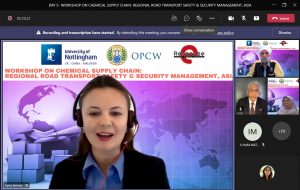June 24, 2022, by Communications
University of Nottingham Malaysia invited to create awareness on safe use of chemicals
The University of Nottingham Malaysia was invited by the Organisation for the Prohibition of Chemical Weapons (OPCW) to organise a conference to raise the awareness of chemical security, which is the safe and peaceful use of chemistry among youths.
This was done through a series of workshops run by key academics at UNM including Interim Provost and CEO Professor Sarah Metcalfe, Vice Provost (Research and Knowledge Exchange) Professor Andy Chan, Dr Kasturi Muthoosamy as the Chairperson of the conference and Professor Khiew Poi Sim as the member of the organising committee.
UNM was honoured to be the host for this prestigious international conference and for its pioneering effort in creating awareness and capacity building on road transport chemical security, which is the first in Asia and the first internationally co-organised with OPCW. The workshops attracted more than 150 participants from all over the world including experts, policy-makers, SMEs, first-responders, academia and students.
These workshops were held in collaboration with OPCW (an international institution under the purview of the UN) and NACWC, Malaysia (Ministry of Foreign Affairs) and a local SME (eResponse Alert Sdn Bhd). UNM received a sponsorship worth RM50,000 from OPCW to conduct this conference.
The main aim of the workshops was to create awareness on chemical transport security to users directly linked to the chemical industry and to future users.
“This one-of-a-kind and important conference which gained attention from both local and international participants, who are mainly policy makers, managers, chairman of institutes, and a small number of academia and 60 UNM students. We are proud to be part of this initiative to foster awareness in chemical security in road transportation and we hope that the participants will benefit immensely from this virtual conference,” Dr Kasturi said.
“Chemical safety is often prioritised whereas chemical security is often overlooked, especially in developing countries. There are no specific guidelines locally or regionally on-road transportation and chemical security and most often, guidelines that are used in developed countries such as Agreement International Carriage of Dangerous Goods by Road guidelines from the United Nations are referred to, however, they may not be applicable to local or Asian settings,” she explained.
The workshop held at the conference also saw the participation of National Authority of Chemical Weapons Convention (NACWC), Malaysian Ministry of Transportation (MOT), Department of Occupational Safety and Health (DOSH), Malaysian Institute of Road Safety Research (MIROS), Polis DiRaja Malaysia, Majlis Keselamatan Negara, Jabatan Pengangkutan Jalanraya (JPJ), Jabatan Bomba dan Penyelamat, Lembaga Pelaburan Johor, Lembaga Pelabuhan Klang, Jabatan Pertanian Malaysia, Science & Technology Research Institute For Defence (STRIDE), Chemical Productivity Nexus (CPN), Chemical Industry Council of Malaysia (CICM), Petronas and universities; UNM, Universiti Sains Malaysia and Universiti Kebangsaan Malaysia.
International participants hailed from Bangladesh, Cambodia, China, India, Iraq, Italy, Myanmar, Netherlands, Pakistan, Qatar, Saudi Arabia, Sri Lanka, Switzerland, UK and Uzbekistan.
In 2020, UNM was chosen by the national authority NACWC to champion creating awareness on chemical security in the academic institutions. Previous efforts included production of a video to promote chemical security in academia and governmental institutions.
As an international university with footprints in the UK, China and Malaysia, the University of Nottingham always looks for opportunities to solve global problems and road transport chemical security is a niche area that is equally important but often overlooked.
“We are honoured to be collaborating alongside the international organisation, OPCW and the local authority. NACWC is not only fostering awareness but also providing a platform to share experiences and best practices among global experts while creating avenues for international cooperation,” said Dr Kasturi.
With awareness created at the university level among the academia, safety managers and technical staff, it is hoped that continuous and sustainable engagements will follow suit, such as design and development of Chemical Security and Transport Security modules in the university.
In this manner, wider propagation of chemical safety and security can be realised in accordance with the Chemical Weapons Convention. In addition, with the introduction and awareness created at the university, inclusion of chemical transport security aspect is expected in research related to supply chain management.
-ends-
-
Post a comment


